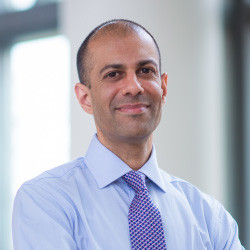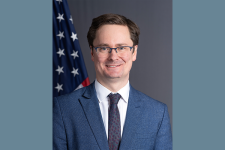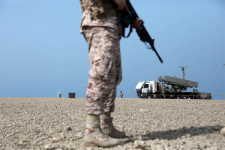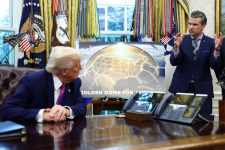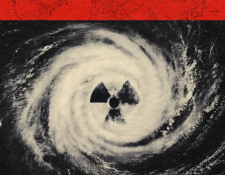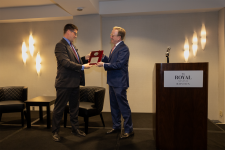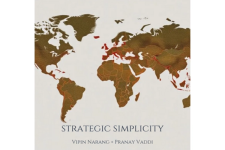Biography
Vipin Narang is the Frank Stanton Professor of Nuclear Security and Political Science and the inaugural director of MIT SSP’s Center for Nuclear Security Policy (CNSP). He first joined the political science faculty in 2010. From March 2022 through August 2024, he served as Principal Deputy Assistant Secretary of Defense and then Acting Assistant Secretary of Defense for Space Policy, a portfolio with oversight over the U.S. Department of Defense’s strategic capabilities, including nuclear, space, missile defense, and cyber policy. For his service, he was awarded the Department of Defense Medal for Distinguished Public Service.
His first book Nuclear Strategy in the Modern Era (Princeton University Press, 2014) on the deterrence strategies of regional nuclear powers won the 2015 ISA International Security Studies Section Best Book Award. His second book Seeking the Bomb: Strategies of Nuclear Proliferation was published with Princeton University Press in 2022. His work has appeared in a variety of outlets including International Security, Journal of Conflict Resolution, The Washington Quarterly, International Organization, Foreign Affairs, The Washington Post, and The New York Times. He was the recipient of the 2020 ISSS Emerging Scholar Award from the International Studies Association awarded to the scholar who “had made the most significant contribution to the field of security studies.”
He received his Ph.D. from the Department of Government, Harvard University in 2010. He holds a B.S. and M.S. in chemical engineering with distinction from Stanford University and an M. Phil with Distinction in international relations from Balliol College, Oxford University, where he studied on a Marshall Scholarship. He has been a fellow at Harvard University’s Olin Institute for Strategic Studies, a predoctoral fellow at Harvard University’s Belfer Center for Science and International Affairs, and a Stanton junior faculty fellow at Stanford University’s Center for International Security and Cooperation. His research interests include nuclear proliferation and strategy, North Korea's nuclear weapons, South Asian security, and general security studies.
Teaching
Selected Publications
Vipin Narang, "When Actions Speak Louder than Words: Adversary Perceptions of Nuclear No-First-Use Pledges, " International Security Vol. 48, No, 4 (Spring 2024) (With Caitlin Talmadge and Lisa Michelini)
Vipin Narang, "Sole Purpose is Not No First Use: Nuclear Weapons and Declaratory Policy," War on the Rocks, February 22, 2021 (With Ankit Panda)
Vipin Narang, “North Korea: Risks of Escalation,” Survival Vol. 62, No. 1 (2022) (With Ankit Panda)
Vipin Narang, "India's Pangong Pickle: New Delhi's Options After its Clash with China," War on the Rocks, July 2, 2020 (With Christopher Clary)
Technology for Global Security Special Report, A New Framework For Thinking About Regional NC3?, NAPSNet Special Reports, September 19, 2019
Vipin Narang, "Is A New Nuclear Age Upon Us?" Foreign Affairs, December 30, 2019 (With Nicholas L. Miller)
Vipin Narang, "Why North Korea Is Testing Missiles Again," Foreign Affairs, May 16, 2019 (With Ankit Panda)
Vipin Narang, “The Hanoi Summit Was Doomed From the Start,” Foreign Affairs, March 5, 2019 (With Ankit Panda)
Vipin Narang, "India's Counterforce Temptations," International Security Vol. 43, No. 3, (Winter 2018/19) (With Christopher Clary)
Vipin Narang, "The Year of Living Dangerously with Nuclear Weapons: Three Crises Washington Could Face in 2019," Foreign Affairs, January 11, 2019 (With Nicholas L. Miller)
Vipin Narang, “Diplomacy Without Denuclearization: North Korea in 2018,” War on the Rocks, December 24, 2018 (With Ankit Panda)
Vipin Narang, "North Korea's Nuclear Program Isn't Going Anywhere," Foreign Affairs, August 13, 2018 (With Ankit Panda)
Books
-
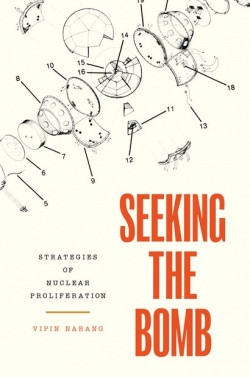
Seeking the Bomb: Strategies of Nuclear Proliferation
Vipin Narang
Princeton University Press, 2022
Much of the work on nuclear proliferation has focused on why states pursue nuclear weapons. The question of how states pursue nuclear weapons has received little attention. Seeking the Bomb is the first book to analyze this topic by examining which strategies of nuclear proliferation are available to aspirants, why aspirants select one strategy over another, and how this matters to international politics.
Looking at a wide range of nations, from India and Japan to the Soviet Union and North Korea to Iraq and Iran, Vipin Narang develops an original typology of proliferation strategies—hedging, sprinting, sheltered pursuit, and hiding. Each strategy of proliferation provides different opportunities for the development of nuclear weapons, while at the same time presenting distinct vulnerabilities that can be exploited to prevent states from doing so. Narang delves into the crucial implications these strategies have for nuclear proliferation and international security. Hiders, for example, are especially disruptive since either they successfully attain nuclear weapons, irrevocably altering the global power structure, or they are discovered, potentially triggering serious crises or war, as external powers try to halt or reverse a previously clandestine nuclear weapons program.
As the international community confronts the next generation of potential nuclear proliferators, Seeking the Bomb explores how global conflict and stability are shaped by the ruthlessly pragmatic ways states choose strategies of proliferation.
-
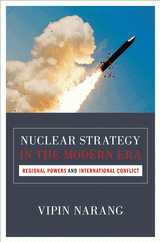
Nuclear Strategy in the Modern Era: Regional Powers and International Conflict
Vipin Narang
The world is in a second nuclear age in which regional powers play an increasingly prominent role. These states have small nuclear arsenals, often face multiple active conflicts, and sometimes have weak institutions. How do these nuclear states—and potential future ones—manage their nuclear forces and influence international conflict? Examining the reasoning and deterrence consequences of regional power nuclear strategies, this book demonstrates that these strategies matter greatly to international stability and it provides new insights into conflict dynamics across important areas of the world such as the Middle East, East Asia, and South Asia.
Vipin Narang identifies the diversity of regional power nuclear strategies and describes in detail the posture each regional power has adopted over time. Developing a theory for the sources of regional power nuclear strategies, he offers the first systematic explanation of why states choose the postures they do and under what conditions they might shift strategies. Narang then analyzes the effects of these choices on a state’s ability to deter conflict. Using both quantitative and qualitative analysis, he shows that, contrary to a bedrock article of faith in the canon of nuclear deterrence, the acquisition of nuclear weapons does not produce a uniform deterrent effect against opponents. Rather, some postures deter conflict more successfully than others.
Nuclear Strategy in the Modern Era considers the range of nuclear choices made by regional powers and the critical challenges they pose to modern international security.
Media
TV/Radio:
Thirteen.org (PBS), "A Nuclear Threat from the Taliban," September 21, 2021.
New England Cable News, "Is North Korea testing the new Biden administration?" March 25, 2021.
CNBC, Squawk Box Asia, "Kim Jong Un may have faced 'domestic hard line pressure'," December 18, 2019.
NPR's Morning Edition, "The Difficulty of Basing U.S. Missiles in Asia," August 9, 2019.
NPR's All Things Considered, "Iran Says It Has Exceeded Uranium Limits Set in 2015 Nuclear Deal," July 1, 2019.
BBC World Service - Newshour, "What did Trump and Kim actually agree on?" June 12, 2018.
WBUR, "Singapore Summit Preview," June 11, 2018.
NPR's All Things Considered, "Pentagon Wants to Deploy 'Low Yield Nuclear Weapons' to Deter Russia From Similar Ones," May 7, 2018.
Talks:
Mittal Institute, Harvard University, "The US Elections Impact on South Asia," October 28, 2020.
Podcasts:
Conversation Six, on the current situation in Ladakh between India and China, April 19, 2021. With Sushant Singh.
Harvard University: "North Korea as a Nuclear Weapons State," September 18, 2018.
WOTR Podcast: "A Big Debate About A Little Nuke," War On The Rocks, March 14, 2018, with Frank Miller, Olga Oliker, Usha Sahay, and Ryan Evans.
Press:
Quoted in "North Korea slams UA test of long-range missile, vows 'military counteraction,'" NK News, November 3, 2023.
Quoted in "The Fragile Balance of Terror: Deterence in the New Nuclear Age," Politics Today, March 28, 2023.
Quoted in "Satellite images appear to show China is making significant progress developing missile silos that could eventually launch nuclear weapons," CNN, November 2, 2021.
Quoted in "At exhibition showing off nuclear arms, N. Korea displays apparent new weapon," Washington Post, October 11, 2021.
Quoted in "France, Striving for Global Power, Still Struggles to Get It," New York Times, September 22, 2021.
Quoted in "Biden Announces Defense Deal With Australia in a Bid to Counter China," New York Times, September 15, 2021.
Quoted in "Kim Jong Un’s North Korea nuclear weapons development puts Biden to the test," Financial Times, September 15, 2021.
Quoted in "North Korea threatens to boost nuclear program ahead of drills between U.S. and 'perfidious' South," The Washington Post, August 10, 2021.
Quoted in "A 2nd New Nuclear Missile Base for China, and Many Questions About Strategy," New York Times, July 26, 2021.
Quoted in "N.Korea's Kim says to prepare for 'both dialogue and confrontation' with U.S. - KCNA," Reuters, June 18, 2021.
Quoted extensively in "As Israel's Dependence on U.S. Shrinks, So Does U.S. Leverage," New York Times, May 24, 2021.
Quoted in "Biden administration is open to sharing corona vaccines with North Korea," CNN.com, May 11, 2021.
Quoted in "India's COVID-19 cases dip from peak, calls for shutdown mount," nasdaq.com, May 10, 2021.
Quoted in "Biden's North Korea policy is an extended hand to Kim Jong Un," Vox.com, April 30, 2021.
Quoted in "North Korea claims 'new tactical guided' missiles launched," BBC News, March 26, 2021.
Quoted in "Japan says North Korea ballistic missile launch threatens peace," Reuters, March 24, 2021.
Quoted in "Analysis: Denuclearisation of what? U.S. switch on North Korea wording raises debate." Reuters, March 18, 2021.
Quoted in "North Korea breaks silence to warn US against 'causing a stink'," CNN.com, March 15, 2021.
Quoted in "Why India Is Facing Possible U.S. Sanctions," Forbes, February 1, 2021.
Quoted in "India sticking to S-400 deal with Russia despite threat of possible US sanctions," Hindustan Times, January 27,2021.
Quoted in "How Trump will hand off the 'nuclear football' to Biden," CNN.com, January 19, 2021.
Quoted in "North Korea's Kim could be planning missile launch to welcome Biden administration," Washington Post, January 18, 2021.
Interview: "There is no legal way to stop Trump from ordering a nuclear strike if he wants to, expert says," by Elizabeth N. Saunders, Washington Post Monkey Cage, January 8, 2021.
Quoted in "Pelosi says she spoke to Gen. Milley about Trump and the nuclear codes," CNN, January 8, 2021.
Quoted in "Iran eyes Biden but could conflict still erupt with Trump?" France24.com, January 5, 2021.
Quoted in "A Trump-Biden foreign policy?" Washington Post, December 2, 2020.
Quoted in "4 looming foreign policy crises that could derail Biden's agenda early on," Vox.com, December 1, 2020.
Quoted in "Who is Mohsen Fakhrizadeh, the Iranian nuclear scientist killed in Tehran attack?" Washington Post, November 27, 2020.
Quoted in "Satellite images indicate Russia is preparing to resume testing its nuclear-powered cruise missile," CNN,com, October 20, 2020.
Interview: "Vipin Narang on the Global Nuclear Landscape: Hype and Reality," The Diplomat, October 13, 2020.
Quoted in "Threat from nuclear weapons and missiles has grown since Trump entered office," Washington Post, October 12, 2020.
Quoted in "Trump's virus treatment revives questions about unchecked nuclear authority," New York Times, October 11, 2020.
Quoted in "Kim Jong Un Marks 75 Years of North Korean Communism With Giant New Missile," Wall Street Journal, October 10, 2020.
Quoted extensively in "The War Isn't Coming Today," Vice, October 2, 2020.
Quoted in "No, the US military did not mobilize its 'doomsday planes' in response to Trump's COVID-19 diagnosis," Business Insider, October 2, 2020.
Quoted in "China and India agree to ‘disengage troops’ in Himalayas," Financial Times, September 11, 2020.
Quoted in "India and China meet to defuse Himalayan border tensions," Financial Times, September 10, 2020.
Quoted in "Images Suggest North Korea May Be Preparing Submarine Missile," New York Times/Reuters, September 4, 2020.
Provided technical information for "Beirut Explosion: What Happened in Lebanon and Everything Else You Need to Know," The Wall Street Journal, August 6, 2020.
Quoted in "New North Korea ICBM report suggests Pyongyang can hit U.S. with Nukes," Newsweek, August 4, 2020.
Quoted in "Modi Says China Isn’t Occupying Indian Territory After Clashes," Bloomberg.com, June 20, 2020.
Quoted in "Modi Finds Neighbors Silent As India-China Tensions Simmer," Bloomberg.com, June 18, 2020.
Interviewed in "This is a Watershed Moment in India-China Relations, says MIT's Vipin Narang," Bloomberg Quint, June 17, 2020.
Quoted in "The drums of war in Asia grow louder," Washington Post, June 17, 2020.
Quoted in "India-China clash: An extraordinary escalation with 'rocks and clubs'," BBC June 16, 2020.
Quoted in "Two Years After Trump-Kim Meeting, Little to Show for Personal Diplomacy," New York Times, June 12, 2020.
Quoted in "A border clash between the world's biggest nations. What could go wrong?" Washington Post, May 28, 2020.
Quoted in "Two years after Trump summit, Kim vows to boost North Korea's nuclear deterrent," Washington Post, May 24, 2020.
Quoted in "Outsiders Consider Possibility of Chaos in North Korea," New York Times, April 30, 2020.
Quoted extensively in "Why the confusion about Kim Jong Un's health actually makes sense," CNN, April 21, 2020.
Quoted extensively in "North Korea Seen Expanding Rocket Launch Facility It Once Promised To Dismantle," NPR, March 27, 2020.
Quoted in "Huge rally will highlight Trump's visit to India," Los Angeles Times, February 22, 2020.
Quoted in "Tom Cotton keeps repeating a coronavirus conspiracy theory that was already debunked," Washington Post, February 16, 2020.
Quoted in "The 2 most controversial national security items in Trump's new budget," VOX.com, February 10, 2020.
Quoted extensively in "US military deploys new type of nuclear weapon seen as countering Russia," CNN, February 4, 2020.
Quoted in "Experts debunk fringe theory linking China's corona virus to weapons research," Washington Post, January 29, 2020.
Quoted in "Iran's attack on Iraq shows how precise missiles have become," The Economist, January 16, 2020.
Quoted in "Iran drives another stake into the heart of the nuclear deal," CNN, January 5, 2020.
Quoted in "Did the Killing of Qassim Suleimani Deter Iranian Attacks, or Encourage Them?" New York Times, January 4, 2020.
Quoted in "North Korea signals end of nuclear-test suspension, promises 'new' weapon," NBC News, January 1, 2020.
Quoted in "North Korea's improved missile systems spark deadline concerns," Financial Times, December 31, 2019.
Quoted in "The Interpreter: India was supposed to represent the future of the international liberal order. Now that's in doubt," New York Times, December 20, 2019.
Quoted extensively in "North Korea may gift the US a long-range missile for Christmas, MIT professor says," CNBC, December 18, 2019.
Quoted in "North Korean tests raise concern and pressure for Trump diplomacy," CNN, December 17, 2019.
Quoted in "North Korea Carries Out 'Very Important Test' at Once-Dismantled Launch Site-KCNA," New York Times, December 7, 2019.
Quoted in "North Korean missile and Kim Jong Un's 'Christmas Gift' decision," BBC News, December 5, 2019.
Quoted in "New images of Kim Jong Un’s horseback ride at a sacred mountain suggest the country’s promised ‘Christmas gift’ will defy Trump," Business Insider, December 4, 2019.
Quoted in "North Korea warns it's up to the U.S. to decide what 'Christmas gift' it will get," the Japan Times, December 3, 2019.
Quoted extensively in "North Korea threatens Japan with 'real ballistic missile'," BBC News, November 30, 2019.
Quoted in "Trump hikes price tag for US forces in Korea almost 400% as Seoul questions alliance," CNN, November 15, 2019.
Quoted extensively in "Kim Jong Un is pushing his own 'maximum pressure' campaign against Donald Trump with latest missile tests, experts say," Newsweek, October 31, 2019.
Quoted in "Trump appears to confirm U.S. nukes are in Turkey, an admission that would break with longstanding protocol," Washington Post, October 16, 2019.
Quoted in "US nuclear bombs at Turkish airbase complicate rift over Syrian invasion," The Guardian, October 14, 2019.
Quoted in "North Korea doubts U.S. will have alternative plans inside two weeks," Reuters, October 6, 2019.
May 16, 2019 Foreign Affairs op-ed cited in "U.S. Nuclear Talks with North Korea Break Down in Hours," New York Times, October 5, 2019.
Quoted in "Kim Jong Un is sending Trump a message with latest nuclear missile test, experts say 'it is not routine'," Newsweek, October 2, 2019.
Quoted in "North Korea fires ballistic missile ahead of nuclear talks," AFP.com, October 2, 2019.
Quoted in "North Korea fires ballistic missile, possibly from submarine, days before talks," Reuters, October 1, 2019.
Quoted in "From Focus to Forgotten: Why No N.Korea Spotlight at UN?" New York Times, September 25, 2019.
Quoted in "Analysis: North Korean Tests Put Pressure on Washington," New York Times, September 10, 2019.
Quoted in "North Korea Missile Tests, 'Very Standard' to Trump, Show Signs of Advancing Arsenal," New York Times, September 2, 2019.
Quoted in "India says committed to 'no first use' of nuclear weapons for now," Reuters, August 16, 2019.
Quoted in "Fast, low, and hard to stop: North Korea missile tests crank up threat level," Washington Post, August 15, 2019.
Quoted extensively in "Failed Russian nuclear test hints at Putin's dangerous plans to beat U.S. defenses," NBC News, August 12, 2019.
Quoted in "Trump says he looks forward to seeing Kim Jong Un 'in the not too distant future'," CNN, August 10, 2019.
Quoted in "Trump sides with N. Korea's Kim on missile tests, war games," AFP, August 9, 2019.
Quoted in "A month after G20, Trump's Asia policy achievements appear to be unraveling," CNN, August 2, 2019.
Quoted in "U.S. Still Hopes for Talks After Latest North Korean Missile Tests," New York Times/Reuter, August 1, 2019.
Quoted in "North Korea Conducts Second Weapons Test in Under a Week," Wall Street Journal, July 31, 2019.
Quoted extensively in "North Korea missile launch a 'new type of threat,' South Korea says," CNN, July 25, 2019.
Quoted in "North Korea fired two projectiles into the sea, South Korea says," Washington Post, July 24, 2019.
Quoted in "After Trump and Kim's handshake, what comes next in US-North Korea talks? Analysis," ABCNews, July 1, 2019.
Quoted in "Trump offers North Korea's Kim weekend meeting in demilitarized zone," Reuters, June 28, 2019.
Quoted in "North Korea denies reports of behind-the-scenes talks with US in sharp rebuttal to South Korea's Moon," CNN, June 27, 2019.
Quoted extensively in "The Clock is Ticking: A Year on from the Singapore summit Kim Jong Un is losing patience with Donald Trump's strategy," Newsweek, June 12, 2019.
Quoted in "North Korea has been testing ballistic missiles. So why won’t Trump use the B word?" Washington Post, May 27, 2019.
Quoted in "Trump appears to contradict Bolton on North Korea, expresses 'confidence' in Kim," Washington Post, May 25, 2019.
Quoted in "Modi's definitive win may mean a more assertive India," CNBC, May 24, 2019.
Quoted in "Iran stance is straight from Trump's North Korea playbook," CNN, May 21, 2019.
Quoted in "To Contain Iran, Trump's Newest Line in the Sand Looks a Lot Like Obama's," New York Times, May 17, 2019.
Quoted in "North Korea launches two short-range missiles, the second set of launches in a week, South Korea says," Washington Post, May 9, 2019.
Quoted in "US Risks Embolding Kim with Muted Response to Missile Test," Bloomberg, May 6, 2019.
Quoted in "North Korea's Kim Jong-un oversees 'strike drills' of new weapons systems," The Telegraph, May 5, 2019.
Quoted in "North Korea Weapons Test May Have Included Ballistic Missile," Bloomberg, May 5, 2019.
Quoted in "Seoul: North Korea Tests Short-Range Projectiles," Voice of America, May 3, 2019.
Quoted in "North Korea test-fires new 'tactical guided weapon' with Kim Jong Un there to observe," LA Times, April 17, 2019.
Quoted in "North Korea tests 'tactical' weapon, report says,"CNN.com, April 17, 2019.
Quoted in "North Korean Dictator Seeks Russian Strongman for Support, Friendship," Wall Street Journal, April 6, 2019.
Quoted in "Did India Shoot Down a Pakistani Jet? U.S. Count Says No," foreignpolicy.com, April 4, 2019.
Quoted extensively in "India Claims Successful Test of Anti-Satellite Weapon," NPR, March 27, 2019.
Quoted in "North Korea pulls out of liaison office with the South in blow to warming ties," Washington Post, March 22, 2019.
Quoted in "US Imposes First N.-Korea Linked Sanctions Since Failed Summit," Voice of America, March 21, 2019.
Quoted in "Trump officials privately bracing for North Korea's next move," CNN, March 19, 2019.
Quoted in "Trump's diplomacy with Kim dims as both sides return to hard-line positions," Washington Post, March 11, 2019.
Quoted in "The art of the no deal: how Trump and Kim misread each other," The Guardian, February 28, 2019.
Quoted extensively in "Was Donald Trump's North Korea Summit a Failure?" Newsweek.com, February 28, 2019.
Quoted in "Who left the island? Who got the rose? The Trump-Kim summit played out like a reality show," The Washington Post, February 28, 2019.
Quoted in "Nuclear-Armed India and Pakistan Face Off in Renewed Escalation," Bloomberg.com, February 26, 2019.
Interview (part 2) by Tobin Harshaw: "Winning the Nuclear weapons Game Against Putin's Russia," Bloomberg.com, February 23, 2019.
Quoted in "Nightmare Result of US-NKorea Talks: Bad Deal, Little Change," New York Times, February 23, 2019.
Quoted in "Tensions are rising between India and Pakistan. But Washington doesn't seem that bothered." Washington Post, February 19, 2019.
Interview by Tobin Harshaw: "Winning the Nuclear Game Against North Korea," Bloomberg.com, February 16, 2019.
Quoted in "North Korea Warns of 'New Path', But Options Limited," New York Times, January 2, 2019.
Quoted in "Kim and Trump Back at Square One: If US Keeps Sanctions, North Will Keep Nuclear Program," New York Times, January 1, 2019.
Quoted in "North Korea launched no missiles in 2018. But that isn't necessarily due to Trump," NBC News, December 27, 2018.
Quoted in "North Korea: secret missile site revealed in new satellite images," The Guardian, December 6, 2018. He was also quoted on the same topic in Newsweek, and in The Telegraph, which reprinted his entire tweet on the topic. On December 7, 2018, ABCNews included his comment in their coverage.
Quoted in "Satellite images reveal hidden North Korean missile bases," CNN.com, November 13, 2018.
Quoted in "North Korea Keeping Up Work on Missile Sites, Report Says," Wall Street Journal, November 12, 2018.
Quoted in "Amid stalled talks, North Korea keeps developing secret ballistic missile sites," ABCNews, November 12, 2018.
Quoted in "North Korea Weaponizes Its Deal With Trump To Tangle Talks," New York Times, October 12, 2018.
Quoted in "Pompeo Hails 'Significant' North Korea Progress; Experts Skeptical," New York Times, October 9, 2018.
Quoted in "Experts dismiss North Korea's latest concession to the U.S.," NBC News, October 8, 2018.
Quoted in "As Pompeo heads for Pyongyang, North Korea appears to raise its demands," The Washington Post, October 3, 2018.
Quoted in "First UN Mil-Mil Talks With North Korea In 11 years; What They Mean," breakingdefense.com, September 25, 2018.
Quoted extensively in "Experts are Underwhelmed By North Korea's Promise To Dismantle Missile Site," NPR.org, September 19, 2018.
Quoted in "North Korea's New Nuclear Promises Fall Short of U.S. Demands," New York Times, September 19, 2018.
Quoted in "'Grand Theater': Has N. Korea's Kim Won a Propaganda Coup?" New York Times, September 18, 2018.
Quoted in "Korean summit: Can Moon and Kim deliver Trump a nuclear win or is it all talk?" South China Morning Post, September 17, 2018.
Quoted in "North Korea's Kim sets denuclearization time line, prompting thanks from Trump," Reuters, September 5, 2018.
Quoted in "Trump blames China for the impasse with North Korea. But the real fault may lie closer to home.," Washington Post, August 30, 2018.
Quoted in "Trump says China actions 'not helpful' in denuclearising N Korea," Financial Times, August 29, 2018.
Quoted in "Donald Trump Sorrowfully Cancels Another North Korea Meeting," The Atlantic, August 24, 2018.
Quoted in "Donald Trump cancels Mike Pompeo visit to North Korea," Financial Times, August 24, 2018.
Quoted in "Thank you for being alive: South Korean family prepares for what might be a last reunion," The Guardian, August 19, 2018.
Quoted in "Why North Korean nukes are still on the table," The Washington Post, August 13, 2018.
Quoted in "Satellite Images Indicate North Korea Has Started Dismantling Rocket Launch Site," Wall Street Journal, July 23, 2018.
Quoted in "Trump releases Kim Jong Un letter, touts 'great progress' despite challenging signs," CNN, July 12, 2018.
Quoted in "North Korea may have offered its clearest view yet of denuclearization," The Washington Post, July 8, 2018.
Quoted in "North Korea Declares U.S. Diplomacy 'Gangster-Like," The New Yorker, July 8, 2018.
Quoted in "U.S. Has Plan to Dismantle North Korea Nuclear Program Within a Year: Bolton," New York Times, July 2, 2018.
Quoted in "Is North Korea secretly continuing its nuclear programme?" BBC News, July 2, 2018.
Quoted in "US secretary of state Pompeo to visit North Korea next week," Financial Times, June 28, 2018.
Quoted in "Satellite images show North Korea upgrading nuclear facility," CNN, June 27, 2018.
Quoted in "Kim Jong Un ends visit to China with a message for the US," CNN, June 20, 2018.
One of several commentators in a CNN piece titled "What just happened? Experts break it down." His piece is titled "Singapore summit buys both Trump and Kim Time." CNN, June 12, 2018.
Quoted in "Trump and Kim nuclear summit agreement contains no new promises," NBC News, June 12, 2018.
Quoted in "U.S. officials meet with North Koreans despite uncertainty surrounding Trump-Kim Summit." The Washington Post, May 27, 2018.
Quoted in "North Korea Skeptics Proved Right," Financial Times, May 24, 2018.
Quoted in "Trump Calls Off Upcoming North Korea Summit," Voice of America, May 24, 2018.
Quoted in "How Kim Jong Un got cold feet," The Washington Post, May 17, 2018.
Quoted in "Trump faces North Korea dilemma after Bolton infuriates Pyongyang," The Guardian, May 17, 2018
Quoted in "Denuclearization: Can Trump and Kim Find a Common Definition?" Wall Street Journal, May 3, 2018.
Quoted in "Trump tempers enthusiasm for North Korea nuclear pledge," Financial Times, April 24, 2018.
Quoted in "An Unpredictable Trump and a Risk-Prone Kim Mean High Stakes and Mismatched Expectations," New York Times, April 23, 2018.
Quoted in "North Korea's definition of 'denuclearization' is very different from Trump's," The Washington Post, April 9, 2018.
Quoted extensively in "What Could Go Wrong? Pitfalls Pose Risks In Trump, Kim Talks," New York Times, March 9, 2018.
Quoted in "U.N. Report Links North Korea to Syrian Chemical Weapons," Wall Street Journal, February 27, 2018.
Quoted in "North Korea Won Pyeongchang Political Gold, but What's Next?" New York Times, February 12, 2018.
Quoted in "North Korea Is Not the Threat Trump Would Have You Believe," The Atlantic, January 31, 2018.
Quoted extensively in "India test-fires Agni-V, a nuclear-capable ICBM," CNN.com, January 18, 2018.
Quoted in "Hawaii and the Horror of Human Error," The Atlantic, January 15, 2018.
Quoted in "Hawaii False Alarm Hints at Thin Line Between Mishap and Nuclear War," New York Times, January 14, 2018.
Quoted in "Few Checks Can Keep Trump's Hands Off His 'Nuclear Button'," US News & World Report, January 3, 2018.
Interview in Technology Review: "Sizing Up the North Korea Showdown," December 19, 2017.
Quoted in "Tillerson: US won't set preconditions for North Korea talks," CNN, December 13, 2017.
Quoted in "North Korea is a nuclear state. But can the U.S. accept that?" Washington Post, December 9, 2017.
Quoted in "A dangerous choice looms for Trump on North Korea," CNN.com, December 8, 2017.
Quoted in "New North Korean Missile Is A 'Monster'," NPR, November 30, 2017.
Quoted in "North Korea has shown us its new missile, and it's scarier than we thought," Washington Post, November 30, 2017.
Quoted in "North Korea Claims New Missile Makes It A Nuclear Power," NPR, November 29, 2017.
Quoted in "North Korea, What we know about the new missile," BBC News, November 29, 2017.
Quoted in "Analysis: N. Korea May Declare 'Victory,' Turn to Economy," New York Times, November 29, 2017.
Quoted in "North Korea Launches Biggest ICBM Yet, Despite U.S. Sanctions," Foreign Policy, November 28, 2017.
Quoted in "North Korea may be producing rare rocket fuel also known as 'devil's venom'," The Telegraph, October 26, 2017.
Quoted in "North Korea Threatens U.S. With 'Strongest Hydrogen Bomb Test Over The Pacific Ocean,'" Newsweek, October 25, 2017.
Quoted in "A Nuclear Deal with North Korea May Be Tillerson's Mission Impossible," New York Times, October 2, 2017.
Quoted in "No one wants another H-bomb test in the Pacific," Popular Science, September 28, 2017.
Quoted in "Remote Textile Plant May Secretly Fuel North Korea's Weapons," New York Times, September 27, 2017.
Quoted in "A North Korea Nuclear Test Over the Pacific? Logical, Terrifying," New York Times, September 22, 2017.
Quoted in "Kim Jong Un: 'Deranged' Trump will 'pay dearly' for threat," Washington Post, September 22, 2017.
Quoted in "North Korea could test hydrogen bomb over Pacific Ocean, says foreign minister," CNN.com, September 22, 2017.
Quoted in "What happens if North Korea tests a hydrogen bomb over the Pacific?" CNN.com, September 22, 2017.
Quoted in "Q&A: America's Options on a Nuclear North Korea," The Wall Street Journal, September 19, 2017.
Quoted in "North Korea wants the world to know it has a working thermonuclear bomb," Popular Science, September 6, 2017.
Quoted in "How Did North Korea's Missile and Nuclear Tech Get So Good So Fast," The Atlantic, September 6, 2017.
Quoted extensively in "How Can US Stop North Korea Nukes? 3 Experts Have Ideas," New York Times, September 6, 2017.
Quoted in "With Powerful Bomb, Kim Dares Both Trump and Xi to Stop Him," bloomberg.com, September 3, 2017.
Quoted in "In latest test, North Korea detonates its most powerful nuclear device yet," Washington Post, September 3, 2017.
Quoted in "Don't be surprised by North Korea's missiles. Kim Jong Un is doing what he said he would," Washington Post, August 31, 2017.
Quoted in "Analysis: Is North Korea Winning Deterrence War with US?" New York Times, August 29, 2017.
Quoted in "Pakistan finds itself on the defensive in Trump's Afghan war strategy," Los Angeles Times, August 22, 2017.
Quoted extensively in "US faces critical moment to negotiate with North Korea, experts warn," The Guardian, August 15, 2017.
Quoted in "The frightening new developments in Trump's standoff with North Korea, explained," vox.com, August 1, 2017.
Quoted in "Missile Launch by North Korea increases threat to US," Financial Times, July 28, 2017.
Quoted in "North Korea and Its Weapons Programs Are Now a Fact of Life," New York Times, July 7, 2017.
Quoted extensively in "European Nuclear Weapons Program Would Be Legal, German Review Finds," New York Times, July 5, 2017.
Quoted in "North Korea showed off a lot of missiles. What might be its targets?" Washington Post, May 18, 2017.
Quoted in "We're Edging Closer to Nuclear War," fivethirtyeight.com, May 15, 2017.
Quoted in "India and Pakistan Escalate Nuclear Arms Race," The Wall Street Journal, March 31, 2017.
Quoted in "India, Long at Odds With Pakistan, May Be Rethinking Nuclear First Strikes," New York Times, March 31, 2017.
Quoted in "Fearing U.S. Withdrawal, Europe Considers Its Own Nuclear Deterrent,' New York Times, March 6, 2017.
Quoted in "In Kim Jong-nam's Death, North Korea Lets Loose a Weapon of Mass Destruction," New York Times, February 24, 2017.
Quoted in "Trump wants a 'top of the pack' nuclear program: does that actually signal a shift?" Christian Science Monitor, February 24, 2017.
Quoted extensively in "Trump, Promising Arms Race, Could Set World on Uncertain Path" New York Times, December 23, 2016.
Quoted extensively in "Trump's Nuclear Weapons Tweet, Translated and Explained," New York Times, December 22, 2016.
MIT News Office interview, July 24, 2015, The US-Nuclear Deal: MIT experts size it up.
Recent News
-
Dr. Matthew Sharp joins the Center for Nuclear Security Policy (CNSP) as a Senior Nuclear Fellow
SSP News
January 5, 2026
-
The North Korean Way of Proliferation: What Aspiring Nuclear Powers Learned From Israel’s Strikes on Iran
Vipin Narang & Pranay Vaddi (CNSP) | Foreign Affairs
September 5, 2025
-
Narang & Vaddi in Foreign Affairs: In Denial? Debating U.S. Nuclear Strategy
Robert L. Gallucci, Vipin Narang, & Pranay Vaddi | Foreign Affairs
August 19, 2025
-
How to Survive the New Nuclear Age: National Security in a World of Proliferating Risks and Eroding Constraints
Vipin Narang & Pranay Vaddi | Foreign Affairs
June 24, 2025
-
Building a Euro Deterrent: Easier Said Than Done,Setting a baseline for Europe's new nuclear conversation
Pranay Vaddi & Vipin Narang | Strategic Simplicity
March 14, 2025
-
Nuclear Proliferation Will Haunt ‘America First’
Ankit Panda, Vipin Narang, and Pranay Vaddi | War on the Rocks
March 10, 2025

